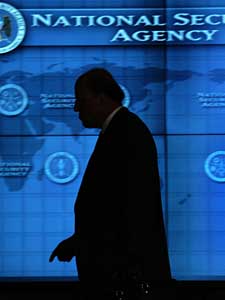
An
NSA electronic surveillance program that operated without
judicial oversight mandated by
Foreign Intelligence Surveillance Act (FISA) was named the
Terrorist Surveillance Program by the
George W. Bush administration
Description While no specific information has been offered, the administration has indicated that the wiretapping program targets communications where at least one party is outside the United States, and where it asserts that there are reasonable grounds to believe that one or more parties involved in the communication have ties to
al Qaeda. However, anonymous sources have come forward stating a small number of instances where domestic calls (entirely inside the United States) were intercepted, due to the usage of international cellphones, have come to light. An anonymous official said the NSA's interception of a small number of communications between people within the United States was apparently accidental, and was caused by technical glitches at the National Security Agency in determining whether a communication was in fact "international."
Wiretapping Prominent legal scholar and blogger Orin Kerr has argued that the program is probably not a wiretap nor call database, but more likely to be a pen register (or tap and trace) tap.
Pen Register Tap Main article: NSA call database Call database News reporting On
December 16,
2005,
The New York Times printed a story asserting that following 9/11, "President
Bush secretly authorized the
National Security Agency to eavesdrop on Americans and others inside the United States to search for evidence of terrorist activity without the court-approved warrants ordinarily required for domestic spying" as part of the
War on Terror.
January 1, 2006 On
January 3, the independent news program Democracy Now!, and later on January 10 ABC news ran a story that, according to NSA whistleblower
Russell Tice, the number of Americans affected by the range of NSA surveillance programs could be in the millions if the full extent of secret NSA programs is considered:
Tice says the technology exists to track and sort through every domestic and international phone call as they are switched through centers, such as one in New York, and to search for key words or phrases that a terrorist might use. "If you picked the word 'jihad' out of a conversation," Tice said, "the technology exists that you focus in on that conversation, and you pull it out of the system for processing." According to Tice, intelligence analysts use the information to develop graphs that resemble spiderwebs linking one suspect's phone number to hundreds or even thousands more. "That would mean for most Americans that if they conducted, or you know, placed an overseas communication, more than likely they were sucked into that vacuum," Tice said.
 January 3, 2006
January 3, 2006 On
January 17 the
New York Times reported, "[m]ore than a dozen current and former law enforcement and counterterrorism officials," some of whom knew of the domestic spying program, "said the torrent of tips [from NSA wiretapping] led them to few potential terrorists inside the country they did not know of from other sources and diverted agents from counterterrorism work they viewed as more productive."
January 17, 2006 On
February 5,
The Washington Post noted that "Fewer than 10 U.S. citizens or residents a year, according to an authoritative account, have aroused enough suspicion during warrantless eavesdropping to justify interception of their (purely) domestic calls, as well. That step still requires a warrant from a federal judge, for which the government must supply evidence of probable cause." Also in the article: "The minimum legal definition of probable cause, said a government official who has studied the program closely, is that evidence used to support eavesdropping ought to turn out to be 'right for one out of every two guys at least.' Those who devised the surveillance plan, the official said, 'knew they could never meet that standard -- that's why they didn't go through'" the
Foreign Intelligence Surveillance Court..
February 5, 2006 On May 10, 2006,
USA Today reported the existence of the
NSA call database.
May 10, 2006 In its issue dated May 22, 2006,
Newsweek put the controversy on the cover of its magazine and ran several stories inside summarizing what is known and speculations about it.
May 22, 2006 Main articles: NSA warrantless surveillance controversy and Church committee Controversy Presidential Authority to Conduct Warrantless Electronic Surveillance to Gather Foreign Intelligence Information January 5, 2006
Statutory Procedures Under Which Congress Is To Be Informed of U.S. Intelligence Activities, Including Covert Actions January 18, 2006

 January 3, 2006
January 3, 2006 Lefthit
Lefthit
No comments:
Post a Comment